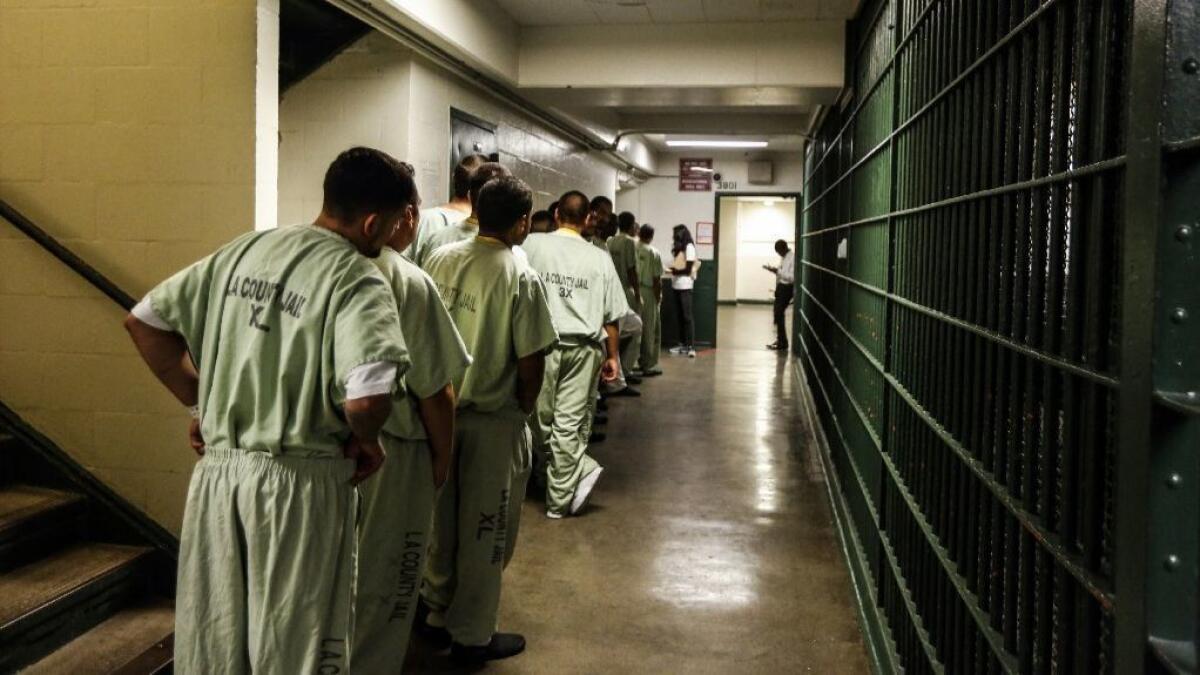Op-Ed: Punish Californians for the crimes they’ve committed, not for murders they didn’t do

A.J. acted as a decoy in an armed robbery committed by her boyfriend in downtown San Francisco in 2005. She was sitting in a parked car a block away when he attempted to rob a second man 15 minutes later, then shot and killed him. Today, A.J. sits in prison in California serving a 25-years-to-life sentence for that murder.
Velia also sits in a California prison, also serving 25-years-to-life for murder, although she too was not present at the scene. Her crime was telling the killer where to find the victim, believing that he was only going to rob him, after the killer threatened to harm her elderly father. When Velia heard that the victim had been hurt, she came to his aid and had her father drive him to the hospital.
Bobby went to an adult prison in California at the age of 15. He spent the next 22 years there for a killing he didn’t do and that he never conceived would happen during the course of a street robbery he committed with a group of teenagers.
A.J., Velia and Bobby were convicted of first-degree murder — the crime that carries the harshest penalties — under what’s called the felony murder rule. The law permits this draconian outcome whenever an individual agrees to commit a serious crime and a death occurs, even if the individual didn’t intend for the victim to be killed, didn’t foresee or know that a killing would occur, or didn’t cause the death. In 1983, the California Supreme Court called the felony murder rule “barbaric” because it divorced intent from culpability, but the justices said that only the Legislature could fix the problem.
The felony murder rule is not only unjust on its face, it is unjust in its application.
Thirty-five years later, this important change may finally come about through Senate Bill 1437, jointly authored by state Sen. Nancy Skinner (D-Berkeley) and Sen. Joel Anderson (R-Alpine). The bill is straightforward: If a participant in a crime did not kill, intend to kill, or did not act with reckless indifference to human life in the death in question, that person cannot be found liable for murder.
The idea is to punish defendants for what they did — robbery or burglary, for example — not for a murder they never fathomed. This bill also applies retroactively to allow people such as A.J., Velia and Bobby — who didn’t kill anyone, didn’t assist in a killing, and didn’t even act with recklessness — to have a court determine if they should be resentenced.
SB 1437 is not, as some opponents have claimed, a get-out-of-jail-free card. Far from it. Each defendant is still guilty of the serious felony he or she committed.
The felony murder rule is not only unjust on its face, it is unjust in its application. A recent survey of California prisoners revealed that the felony murder rule was disproportionately used against youth of color and that 72% of women serving time for first-degree murder under the felony murder rule were not the perpetrators of the homicide.
Enter the Fray: First takes on the news of the minute from L.A. Times Opinion »
Although exact numbers are hard to come by, research indicates that there may be up to 800 people who did not kill nor intend to kill, but who have nevertheless been sentenced to life imprisonment in California. Despite the way they’ve been labeled, these people are not murderers. They should be provided the opportunity to return to court and ask to be resentenced.
All other nations that trace their legal systems to England’s common law tradition — including England, Canada, Ireland and India — have abolished felony murder. Some states, including Massachusetts, Hawaii, Kentucky and Michigan, have also abolished it. But SB 1437 merely revises California’s statute, so as to better apportion criminal liability according to individual responsibility.
If SB 1437 is signed into law, anyone who intentionally kills another person or aids and abets the killer can still be found guilty of murder. Anyone who conspires with another to commit a murder can still be found guilty of murder. Anyone who acts with reckless indifference to human life can still be found guilty of murder. The bill would not change the way gang members are prosecuted for killings carried out to benefit their gangs. It would not affect the three-strikes law or any of the hundreds of “enhancements” — such as using a weapon — that mandate long sentences for serious felonies.
The broad application of the felony murder rule in California has resulted in scores of what amount to wrongful convictions. A.J., Velia and Bobby should be held accountable for what they did, not sent away for life — and at great taxpayer expense — for murders they did not commit, intend or foresee.
Kate Chatfield is the policy director for Re:Store Justice, a California criminal justice reform organization. Lara Bazelon is an associate professor at the University of San Francisco School of Law, where she directs the Criminal and Juvenile Justice Clinic and the Racial Justice Clinic. Bazelon is on the board of directors of Re:Store Justice.
Follow the Opinion section on Twitter @latimesopinion and Facebook.
More to Read
A cure for the common opinion
Get thought-provoking perspectives with our weekly newsletter.
You may occasionally receive promotional content from the Los Angeles Times.










